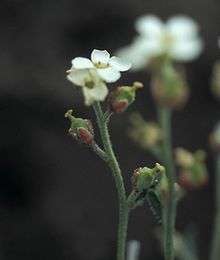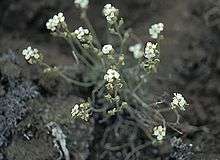Braya pilosa
Braya pilosa is a long-lived perennial flowering plant of the mustard family known by the common name hairy braya.[2][3] It has one to many stems 4–12 cm long, erect to ascending to almost prostrate and moderately to densely hairy, and can be distinguished from other Braya species by its large flowers and globose fruits with very long styles.[3] The plant arises from a tuft of basal leaves, with white flowers arranged in dense clusters.[2] Its range is limited to the unglaciated portions of Cape Bathurst and Baillie Islands on the shore of the Beaufort Sea in the Northwest Territories, and it is listed at G2 - imperiled by NatureServe[1] and endangered by the Committee on the Status of Endangered Wildlife in Canada (COSEWIC).[4] Its chief threats are loss of habitat through rapid coastal erosion and saline wash from storm surges, and by melting permafrost.[5]
| Braya pilosa | |
|---|---|
 | |
| Scientific classification | |
| Kingdom: | Plantae |
| Clade: | Tracheophytes |
| Clade: | Angiosperms |
| Clade: | Eudicots |
| Clade: | Rosids |
| Order: | Brassicales |
| Family: | Brassicaceae |
| Genus: | Braya |
| Species: | B. pilosa |
| Binomial name | |
| Braya pilosa | |

References
- "Braya pilosa - Hook. Hairy Braya". NatureServe Explorer. NatureServe. Retrieved 16 June 2016.
- "Species Status Report: Hairy Braya (Braya pilosa)" (PDF). NWT Species at Risk. Department of Environment and Natural Resources, Northwest Territories. Retrieved 16 June 2016.
- Harris, James G. "COSEWIC Assessment and Status Report on the Hairy Braya Braya pilosa in Canada" (PDF). Species at Risk Public Registry. Government of Canada. Retrieved 16 June 2016.
- "Species Profile: Hairy Braya". Species at Risk Public Registry. Government of Canada. Archived from the original on 12 July 2016. Retrieved 11 June 2016.
- "Braya, Hairy | Braya pilosa". COSEWIC Wildlife Species Search. COSEWIC. Archived from the original on 10 August 2016. Retrieved 16 June 2016.
Further reading
- Harris, James G. (October–December 2004). "Pilose Braya, Braya pilosa Hooker (Cruciferae, Brassicaceae), an enigmatic endemic of arctic Canada". The Canadian Field Naturalist. 188 (4): 550–7.
